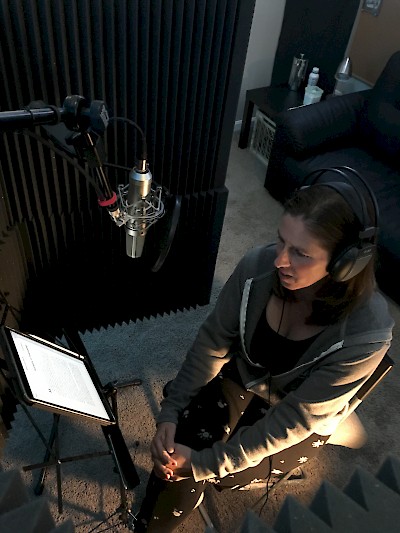
This month, I’ve been going to a recording studio here in town a few days each week, narrating the audiobook version of my upcoming book, Would I Lie to You? The Amazing Power of Being Honest in a World That Lies.
It is an interesting process.
I always knew that if my agent sold the audio rights for the book, I wanted to be the one to narrate it. This is mostly because of Barbara Bradley Hagerty.
The first non-fiction audiobook I ever listened to was Hagerty reading her book, Life Reimagined: The Science, Art, and Opportunity of Midlife. I listened to it on a long solo drive home from a writers’ colony two years ago, and I was smitten. Hearing her tell her own stories and parse out the research felt transformational to me. So much so that I’m pretty sure she helped me avoid having a midlife crisis, which I wrote about in this piece for The New York Times.
Then last year, on that same solo drive home from the same writers’ colony, I listened to Kim Brooks reading her book, Small Animals: Parenthood in the Age of Fear. Once again, hearing the author tell her own story felt illuminating—like I was getting to hear “the real” story. I heard it the way she wanted it to be heard.
As an author, I wanted that, too. The thought of hearing another woman—even the best professional narrator out there—read some of the most intense, confusing, shameful, and wonderful moments of my life was too much for me to bear.
In the audio rights negotiation, my agent helped me secure the right to audition to narrate. And then I practiced a lot—even getting tips from a friend of mine who used to be a radio producer—submitted a demo, and got the gig.
Which brings me to right now, and the process of reading the book.
My audio engineer, Justin, has been a great coach. I’ve quickly learned some of the basics, like you have to swallow in between paragraphs or sentences, and make sure it’s a long enough pause that the engineer can get rid of it. You have to take multi-syllabic words slowly (“particularly” has been my biggest nemesis, but I have nearly tamed it) and you have to change your rhythm and pacing when you are quoting someone, to create auditory quotation marks. You also have to figure out what to do with parentheticals (which apparently I like a lot—case in point!) to make them flow, but also not quite flow.
What has surprised me the most is that my brain intuitively knows how to read aloud so well. Or maybe it’s not intuitive at all, but instead, has been learned from the thousands and thousands of hours I’ve spent silent reading. That my brain and eyes know how to track a paragraph and slow down or speed up, tweak the inflection in front of a series of things set off by commas, know if a “but” starting a sentence needs a longer pause or no pause at all, and know which words in a sentence to emphasize is nothing short of magic. Sometimes as I’m reading, I will think: How does my brain know what to do? I am having this thought right now, as my brain is knowing what to do. This is amazing!
That said, I do sometimes get halfway through a sentence and realize that I have read it wrong. I do trip up here and there. But most of my flubs are word fumbles when too many similar sounds or repeated consonants are clustered together, or my brain is tired, and I suddenly see the word “hypocritical” as “hyper-critical.” I can go pages without messing up, and then get tangled up five times in a row in one paragraph.
But I have to say, as exhausting as it is to stay focused for a few hours at a time, sitting with my back straight and being conscious of every breath, swallow, and pause, reading the book I wrote is exactly as gratifying as I hoped it would be.
I’m not a SAG member, my voice isn’t perfect, and a professional narrator could do it all better technically. But it’s me, sitting right beside you, telling you everything that happened when I decided to focus on honesty.

